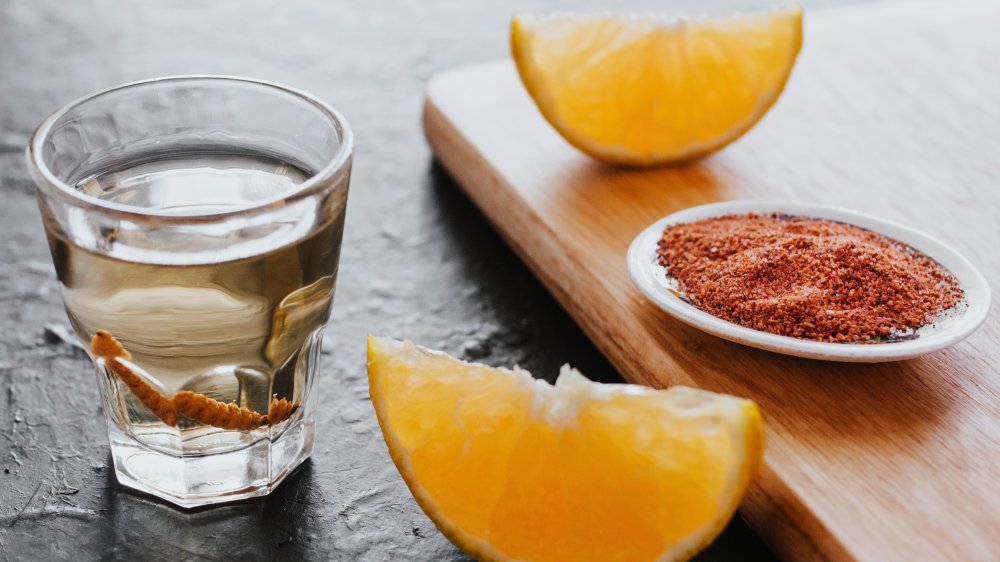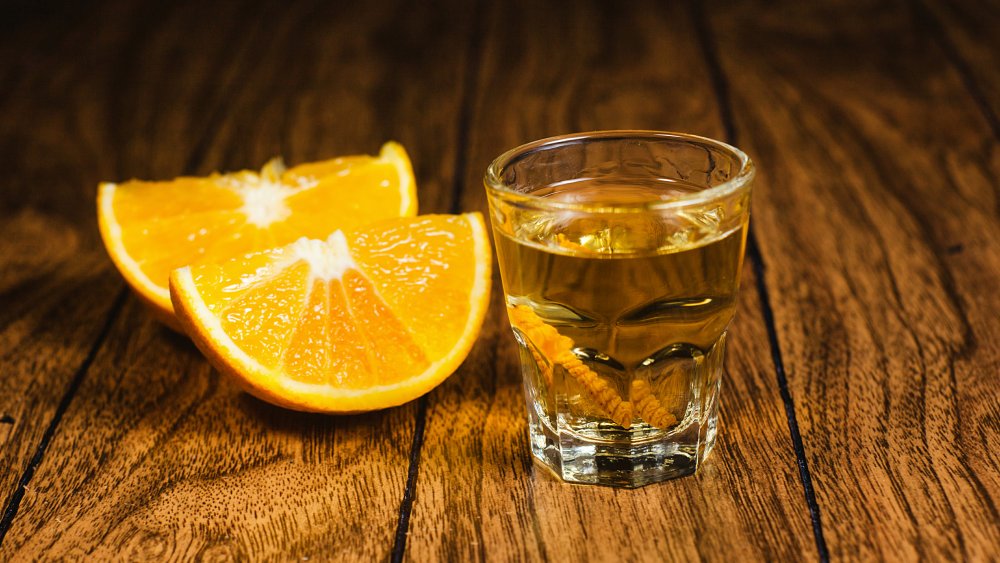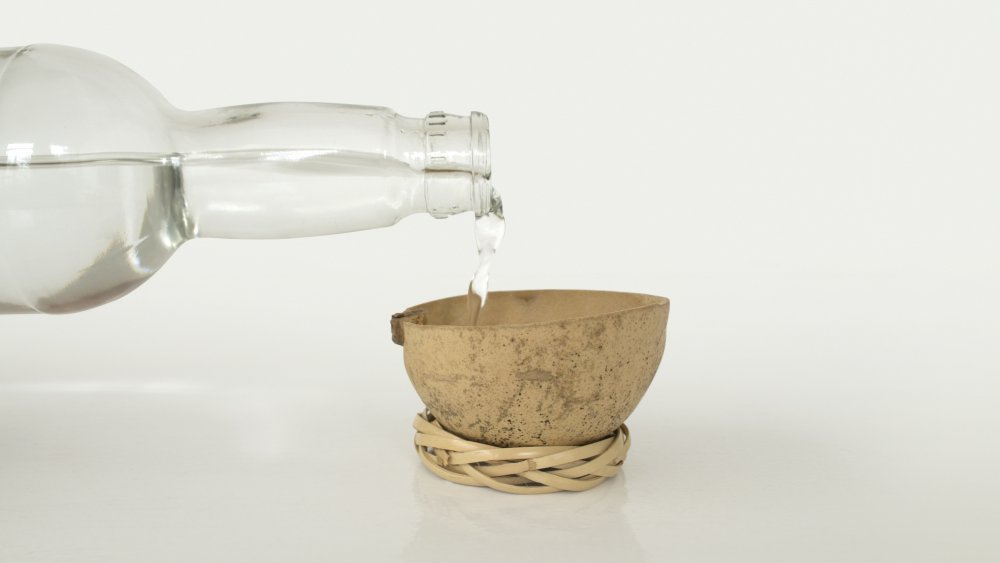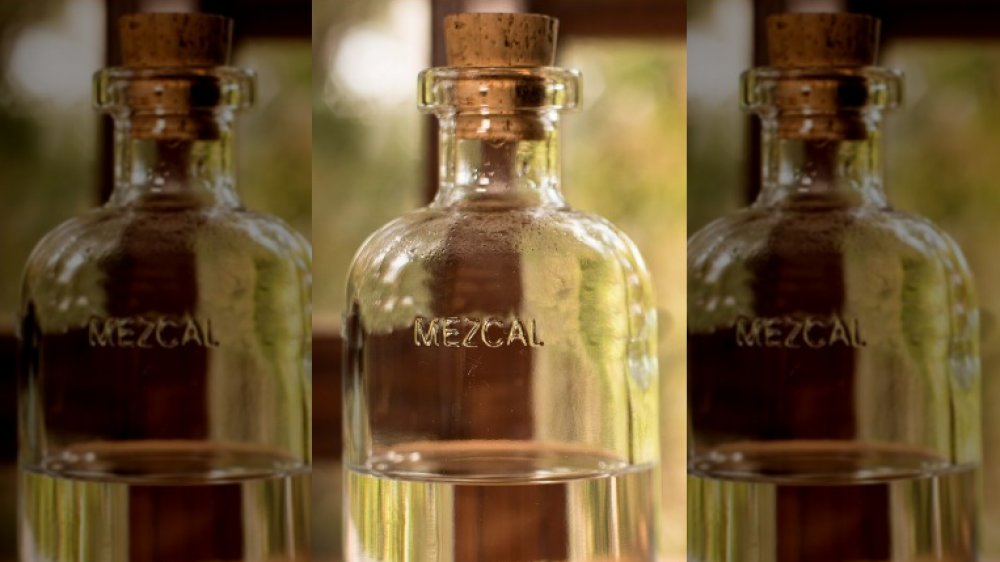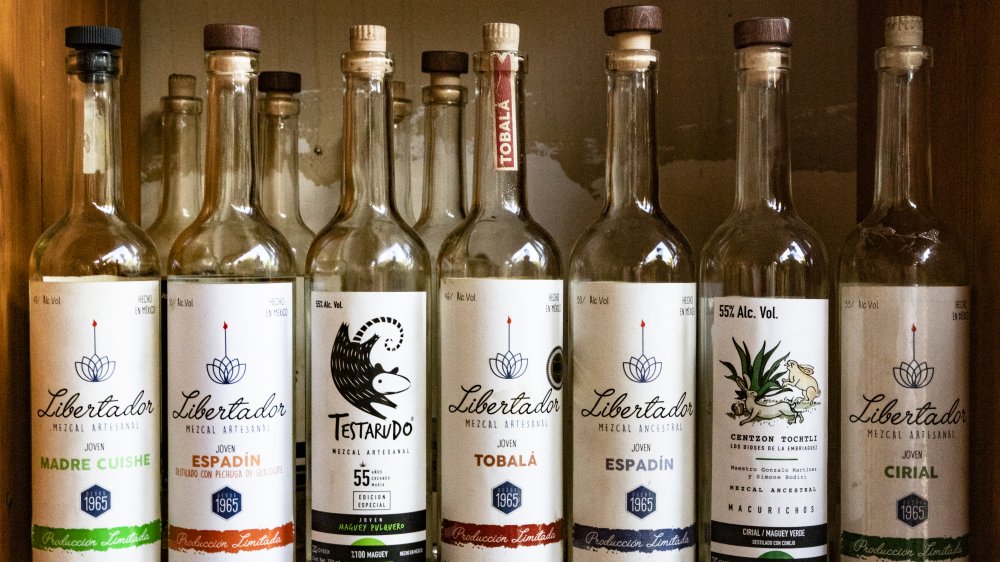When You Drink Mezcal Every Night, This Is What Happens To Your Body
If you drink mezcal, you already know it always makes a big impression, whether sipped neat or mixed into a modern take on a classic cocktail like the margarita. And many are really starting to take notice. Fortune magazine reported that sales of mezcal rose 25 percent between 2014 and 2019, according to data from IWSR, which tracks alcohol sales around the world.
If you're a fan of this smoky Mexican spirit, you probably think of mezcal as tequila's more sophisticated and complex older brother. While it's true that both liquors are made from agave, there are a few key differences that set mezcal apart. According to Town & Country, mezcal can be made from any type of agave, while tequila must be made from blue agave. (Technically, this makes tequila a type of mezcal.) The spirits are distilled differently and produced in different regions of Mexico. Most importantly, mezcal must be 100 percent agave, while tequila only needs to contain 51 percent agave.
It's mezcal's purity that has earned it a reputation as a "healthy" alcohol. But does mezcal deserve all the hype? How would drinking mezcal every night affect your body and mind?
The worm at the bottom of mezcal won't make you hallucinate
Yes, some bottles of mezcal include a creepy crawly surprise at the bottom, but no, it won't make you hallucinate if you drink mezcal and eat it.
First things first: The "worm" at the bottom of some bottles of mezcal isn't actually a worm, as noted by Vice. It's the caterpillar form of a species of moth that lives in agave plants. Despite its reputation, it doesn't have any hallucinogenic properties. However, it does affect the mezcal's flavor profile. In an interview with the Associated Press, Jose Lopez, a mezcal distiller in Oaxaca, Mexico, explained that the gusano de maguey (agave worm) is there simply to add a special something to the mezcal. ″The worm gives it flavor,″ he shared. "It has an aroma and a flavor that people like."
In fact, despite all the mystique surrounding the mezcal worm, its inclusion may have simply been a marketing tactic that began in the 1940s and 1950s to help spark American interest in mezcal and separate it from the better-known tequila.
If you drink mezcal every night, know that the worm in the bottle is a good source of protein
Despite the ick factor, the gusano de maguey at the bottom of a bottle of mezcal — what we know as the worm — is actually a very healthy snack. According to Taste Atlas, these caterpillars are a great source of protein and have a taste similar to pork rinds. They're actually a common street food in Oaxaca, roasted or deep-fried and served in a tortilla with green tomatoes, lime, and chili.
While a mezcal worm might not be at the top of your list when it comes to late-night, alcohol-fueled cravings, especially if you drink mezcal every night, according to a 2013 report issued by the Food and Agriculture Organization of the United Nations, we should all be adding more insects to our diet. They're highly nutritious, easy and inexpensive to raise, and have much less of a negative environmental impact than other more familiar animal sources of protein, such as beef and pork.
So, if your friends dare you to eat the gusano de maguey after a night of drinking and you're feeling particularly bold (or maybe just drunk), don't be afraid to give it a try.
When you drink mezcal every night, you may be consuming health-promoting compounds
Mezcal owes much of its reputation as a "healthy" spirit to the agave plant from which it's distilled. Camille Austin, the global portfolio ambassador for Casa Lumbre Spirits, sang the praises of the agave plant in a 2019 interview with Maxim: "It is a plant that is made up of many organic compounds, or terpenes, commonly known as essential oils, that lend to the herbal, citrus and fruity flavors, as well as the 'magical' feeling we get when we drink mezcal."
Agave — and thus the mezcal produced from it — has a number of terpenes. But what exactly are terpenes? According to Medical News Today, they're a large group of aromatic compounds that give plants their distinctive smell. Terpenes serve numerous functions in plants, from attracting pollinators to helping to repair damage, but many are also bioactive in humans and may have positive health effects, including positive influences on "mood and stress levels."
If you drink mezcal every night, will the drink expose you to cancer-causing chemicals?
While people who drink mezcal every night may like to highlight the spirit's purity, mezcal, like all alcoholic beverages, contains the chemical ethyl carbamate, which has been linked to various types of lung, liver, and blood cancer.
According to a National Toxicology Program technical report, ethyl carbamate, also known as urethane, is a natural byproduct of fermentation. Individuals are exposed to ethyl carbamate largely through drinking alcoholic beverages. In the 14th edition of its Report on Carcinogens, the National Toxicology Program declared that urethane was "reasonably anticipated to be a human carcinogen" based on evidence from animal-based lab studies.
Luckily, the levels of ethyl carbamate in mezcal don't appear to be dangerously high. In a 2009 study published in the International Journal of Environmental Research and Public Health, Dr. Dirk W. Lachenmeier and colleagues analyzed the ethyl carbamate levels of mezcal, tequila, and other agave-based alcoholic beverages. They found that none of them had an ethyl carbamate concentration that exceeded the international safety guideline of less than 0.15 mg/L.
When you drink mezcal every night, you could be protecting yourself against cancer
Limonene, one of the terpenes found in mezcal, could have cancer-fighting properties. In a 2006 paper published in the Journal of Agricultural and Food Chemistry, Dr. Antonio De León-Rodríguez and colleagues took a close look at the chemical makeup of mezcal. While many of the compounds they found were also present in tequila and other alcoholic beverages, they noted that, among the beverages they examined, limonene was only found in mezcal.
A research team examined limonene's ability to destroy lung cancer cells and published the findings in 2018 in the journal OncoTargets and Therapy. They found that limonene did possess anti-tumor effects, but this experiment was limited to cells grown in a laboratory. It's still unclear if the limonene found in mezcal would have the same effect in humans.
According to WebMD, limonene is also used in alternative medicine to treat obesity and bronchitis, but its effectiveness in treating these conditions has not been scientifically proven. Still, for this reason, choosing to drink mezcal every night — in moderation, of course — doesn't sound so bad.
You could feel less stressed when you drink mezcal every night
Any alcoholic beverage after a long, hard day can help you unwind and lift your spirits, but mezcal contains a terpene called geraniol that may have additional benefits for your mental health. So, choosing to drink mezcal every night in moderation may be something to consider.
In a study published in Physiology & Behavior in 2015, a team of researchers led by Dr. Xue-Yang Deng examined the effect geraniol had when administered to mice who were experiencing "chronic" and "unpredictable" stress, though "mild." The researchers found that the geraniol had an antidepressant-like effect on the mice, suggesting that the terpene could have important therapeutic benefits for humans struggling with stress and depression. But since the study wasn't performed on humans and didn't use geraniol specifically from mezcal, it's hard to say if the spirit would have the same mood-boosting effects.
It would be great if it did because stress is a problem many Americans grapple with every day. According to a survey conducted in 2018 by the Mental Health Foundation, 74 percent of Americans felt so stressed they were "overwhelmed or unable to cope." Of those, slightly more than half (51 percent) reported also feeling depressed, and 61 percent reported feelings of anxiety.
You could help lower your blood pressure when you drink mezcal every night
If you're struggling with hypertension, choosing to drink mezcal every night may help keep your blood pressure in check.
Citronellol is a terpene found in agave, as well as many other plants. In a 2010 study published in Basic & Clinical Pharmacology & Toxicology, a team of researchers administered a pure citronellol extract to rats to see what effect it had on the rodents' blood pressure. They found that it relaxed the muscles that line blood vessels, causing them to widen and blood pressure to decrease (a process known as vasodilation).
While the study only examined the terpene in isolation and focused on rats rather than humans and did not examine mezcal specifically, the findings suggest that mezcal, which contains agave and thus citronellol, might be able to lower blood pressure in humans. That would be a big plus because, according to the Centers for Disease Control and Prevention (CDC), 45 percent of American adults have hypertension, and high blood pressure was linked to over 472,000 deaths in the United States alone in 2017.
When you drink mezcal every night, you could protect yourself from free radicals
The term "free radicals" gets thrown around a lot these days, but what exactly are they, why are they bad, and how could your choice to drink mezcal every night protect you from them?
Free radicals are highly reactive atoms created when oxygen molecules inside the body split, as explained by Medical News Today. These atoms are very chemically unstable and will essentially steal electrons from cells in the body. Over time, this damages the cells in a process called oxidative stress. Oxidative stress has been linked to the aging process and a number of chronic diseases and conditions.
But eugenol, a terpene found in mezcal, could help combat the damage caused by free radicals. In a paper published in the journal RSC Advances, a team of researchers led by Dr. Anees Ahmed Khalil at the University of Agriculture in Faisalabad, Pakistan, documented eugenol's ability to prevent oxygen molecules from splitting and to "scavenge" (bind to) free radicals and prevent oxidative stress in the body. While the scientists didn't examine the eugenol in mezcal specifically, it's likely that eugenol from any source would have this effect.
Can your decision to drink mezcal every night help fight inflammation?
Unfortunately, the jury's still out when it comes to mezcal and inflammation.
Farnesol, a terpene in mezcal, may have anti-inflammatory properties, according to a 2018 paper published in the journal Molecules. On the other hand, a 2010 study published in the World Journal of Gastroenterology found that heavy consumption of alcohol in general has a pro-inflammatory effect throughout the body. Neither study focused on mezcal specifically, but it looks like your favorite Mexican spirit may be a double-edged sword when it comes to inflammation.
In fact, inflammation can be both a good and a bad thing, depending on how long it lasts, as noted by Harvard Medical School. The acute inflammation that immediately follows an injury and results in redness, swelling, and pain is beneficial — it's how your body protects the affected area and begins the healing process. But if this response keeps going long after the initial injury is gone, it can cause the immune system to get confused and start attacking healthy tissue. Chronic inflammation has been implicated in a number of conditions, including diabetes, arthritis, heart disease, and cancer.
When you drink mezcal every night, you could improve your bone health
Mezcal and the agave plant it comes from are both high in fructans, a type of carbohydrate. In 2014, a study in the Journal of Medicinal Food suggested that agave fructans prevented bone loss and encouraged formation of new bone by raising calcium concentrations in both bone and circulating blood. Although their experiment was performed on mice, it's possible that agave fructans could have the same impact on humans.
According to the National Osteoporosis Foundation, 10 million Americans have osteoporosis and another 44 million have low bone density, which puts them at risk of developing osteoporosis later in life. Approximately 50 percent of women and 25 percent of men will break at least one bone in their lifetime as a result of osteoporosis.
So, in addition to getting enough calcium, vitamin D, and exercise, you may want to consider deciding to drink mezcal every night to help strengthen your bones, especially if you're older.
You may not want to drink mezcal every night if you're worried about kidney stones
A 2006 study published in the Journal of Agricultural and Food Chemistry found that all Mexican spirits distilled from agave, including mezcal, had high concentrations of oxalates. And that's bad news for your kidneys.
Oxalates are tiny molecules found in many nuts, seeds, and edible plants. They create crystals by binding calcium and other minerals together. These crystals can disrupt the proper functioning of nerves, connective tissue, the intestinal tract, and especially the kidneys and bladder. They can lead to kidney stones, which can be extremely painful and may require medical intervention to remove. According to the University of Wisconsin–Madison, approximately 13 percent of men and 7 percent of women will experience at least one kidney stone in their lives, and having one kidney stone makes you 80 percent more likely to have another within the next ten years.
If you've had kidney stones in the past or are particularly concerned about your renal health, you may not want to drink mezcal every night.
If you drink mezcal every night, it won't ruin your gluten-free diet
According to the Celiac Disease Foundation, one percent of Americans have celiac disease and 0.4 percent have a diagnosed wheat allergy. Beyond Celiac noted that 18 million Americans have a non-celiac disease sensitivity to gluten. But if you're one of the many Americans abstaining from gluten, there's no need to give up mezcal.
Lisa Richards, a nutritionist and author of The Candida Diet, explained that mezcal's purity is what makes it safe for those who can't have gluten. Richards told The List, "Mezcal is naturally gluten-free, making it an alcohol ideal for anyone with a gluten intolerance or allergy. Unlike tequila, which can be made with 51 percent blue agave and 49 percent added sugar from other sources [that could contain gluten], mezcal is made from 100 percent agave."
Richards pointed out that, although the distillation process should, in theory, destroy the gluten in alcohols produced from grains like wheat and rye, "cross contamination and tiny gluten proteins surviving the process may lead to a reaction in some." So it's best to stick with an alcohol that's naturally gluten-free, like mezcal.
One caveat: Sipping straight mezcal is safe, but, if you want to try a mezcal cocktail, you'll need to double-check that the other ingredients are also gluten-free. You could probably add a couple of cocktail ingredients to your list of foods you didn't know contain gluten.
You'll need to carefully select which mezcal you drink if you're following a vegetarian or vegan diet
If you're among the five percent of Americans who identify as vegetarian or three percent who follow a vegan lifestyle, you'll need to do your research before opening up a new bottle of mezcal.
In addition to avoiding brands that include the gusano de maguey (what we know as the worm), you'll want to keep an eye out for — and stay far away from — pechuga mezcal. To make this unique style of mezcal, distillers hang a raw chicken breast ("pechuga" in Spanish) inside the still during the distillation process, according to Wine Enthusiast. The heat inside the still cooks the chicken breast, eliminating any risk that the final product will contain harmful bacteria. The fat and juices from the chicken add a savory undertone to the mezcal, while collagen from the meat gives it a more "robust mouthfeel."
These meaty mezcals are still relatively hard to find in the United States, but several brands, including Del Maguey, El Jolgorio, Wahaka, and Rey Campero, offer pechuga-style options. If you're following a plant-based diet and want to try one of these brands, be sure to check the label carefully to make sure no meat was used in the distillation process.
If you don't want a hangover the next morning, mezcal is a good option
No one wants to wake up feeling awful after a fun night out, and mezcal may be less likely than other spirits to produce a hangover.
In an interview with Bon Appetit, mezcal distiller Yola Jimenez pointed to mezcal's purity as the reason it causes fewer hangovers. "Many alcohols have a ton of sugar and other chemicals. My brand has absolutely nothing but organic agave and water," Jimenez shared. "When you wake up after drinking it, you feel the same way as you do when you drink natural wines. Your body just recognizes the difference." (While Jimenez is referring specifically to her brand, Yola Mezcal, by Mexican law, all mezcal must contain 100 percent agave.)
The fact that mezcal is a clear spirit also plays a role. According to the Mayo Clinic, congeners are compounds that increase the likelihood and severity of a hangover. While they're found in all alcoholic beverages, dark liquors have higher concentrations of congeners than clear spirits.
That being said, too much of any alcohol can give you a hangover, so it's important to drink responsibly when enjoying mezcal. Curious about why you sometimes feel awful the morning after drinking? Learn what happens to your body when you have a hangover.

